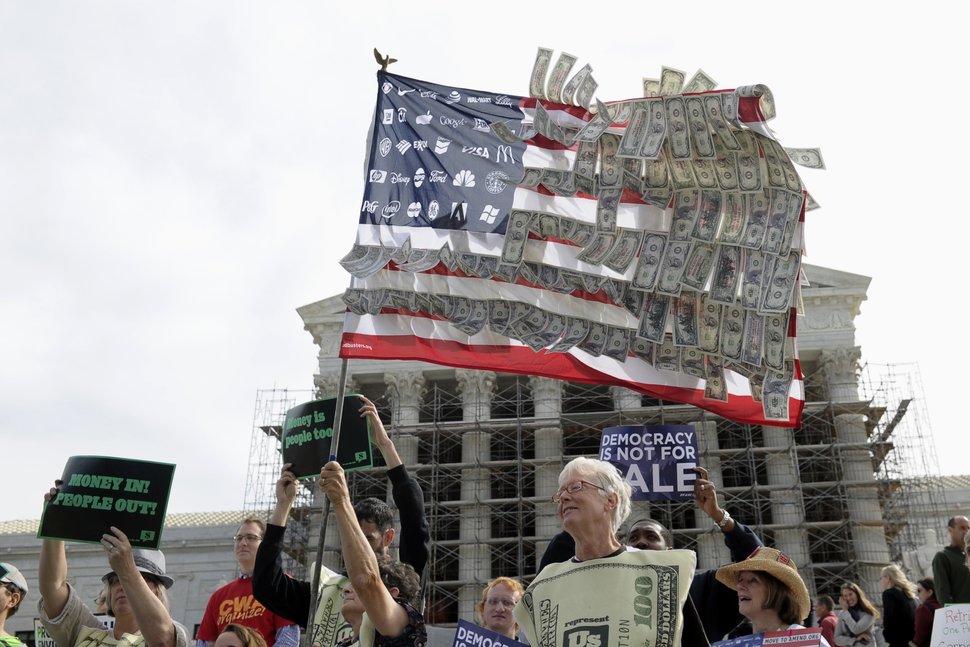Setting no corporate spending limit on political communications, the Supreme Court’s decision in the landmark case Citizens United v. Federal Election Commission continues demonstrably enabling historic levels of corporate influence on policy and risking gradual erosion of the nation’s democratic process.
The Supreme Court’s 5-4 decision in January 2010 grants corporations, non-profit organizations and labor unions the freedom to spend limitless sums of money in support of or in opposition to a political candidate. Often credited for creating the controversial Super-PAC, a remarkably effective means of accepting endless financial contributions from corporations, and donating the money to a political campaign, rather than directly paying a political candidate.
Moreover, this paramount case raises crucially prevalent questions regarding free speech, political communication, corporate personhood and others that likewise remain a subject of rigorous and necessary debate. Despite the deciding majority’s conclusion that “no sufficient governmental interest justifies limits on the political speech of nonprofit or for-profit corporations,” the political spending data is unapologetically clear in presenting a potentially necessary case for limiting corporate speech.
In the decade following the Court’s ruling on Citizens United v. Federal Election Commission, non-party independent groups increased election-related spending beyond the total $750 million spent by the two earlier decades, up to a whopping $4.5 billion. Additionally, the same 10-year stretch featured the 10 most wealthy political players and their spouses infusing over $1.2 billion into federal elections, and groups who refrain from disclosing their donors’ identity launched upwards of $963 million in U.S. elections, according to the Center for Responsive Politics.
Taking the stage during the almost immediate aftermath of the Supreme Court’s decision, former President Obama scolded the judicial branch during his State of the Union Address saying, “Last week, the Supreme Court reversed a century of law that I believe will open the floodgates for special interests, including foreign corporations to spend without limit in our elections.” The president’s criticisms were entirely valid, as one of the most damaging products of Citizens United v. Federal Election Commission is the emergence, integration and increasingly dominant role of dark money in U.S. elections.
Dark money is typically referred to as funds used during a political election for the purpose of swaying a voter’s decision, but the funding’s source is not disclosed. Recently published financial data from OpenSecrets casts light on dark money’s problematically sizable presence in the 2020 presidential election. This data relays that there was more than $1 billion total in dark money during the 2020 elections. Additionally, the report said, “Biden’s campaign raised around $174 million in support from anonymous donors, more than six times the $25.2 million in dark money contributions and spending boosting (former) President Donald Trump’s unsuccessful re-election effort.”
Forming a coalition of sorts, a group of Senate Democrats is now collaborating with the SEC to implement a bill requiring all publicly traded companies to disclose their political spending inside and outside of lobbying organizations, to their shareholders. Working against the efforts to close this flawed loophole, the U.S. Chamber of Commerce, an immensely powerful lobbying group, has ramped up efforts to stop this bill from seeing the light of day. The Chamber of Commerce’s executive vice president, Tom Quaadman, said in a statement to the Financial Times, “Such a rule would make the SEC the arbiter of free speech, as well as the rights of companies to petition the government. These are fundamental rights.” According to Quaadman, his lobbying organization has already started contacting members of the House and Senate, in hopes of generating support for rejecting the proposal.
Quaadman is essentially echoing the deciding majority of the Supreme Court’s logic: spending is speech. A crucially important counterargument against the decision is found in the over 80-page-long dissenting opinion, written by Associate Supreme Court Justice, John Paul Stevens. In his dissent concurring with Justices Ginsberg, Breyer and Sotomayor, Stevens wrote the court’s decision was, “a rejection of the common sense of American people, who have recognized a need to prevent corporations from undermining self-government.” There are valid reasons why regulations should be put into place, beginning with the fundamental moral principle that absolute power corrupts absolutely.
Reaching consensus on this issue seems nearly impossible, considering that income inequality and wealth distribution continue widening a pre-existing socioeconomic schism. There is a slippery slope in restraining any individual freedoms and frankly, it seems hard to justify in the vast majority of situations, but at the end of the day, a corporation is simply not a person. The best chance for an improved policy is not calling for one that deprives corporations of their ability to freely support or oppose a candidate with their earned resources, but by perhaps establishing some form of a reasonable spending limit.
Unfortunately, both political parties are undeniably benefitting their corporate interests, as well as receiving copious amounts of funding from them. This is growing especially true of Democrats, ironically referred to as the party of the people. Arguably, the party’s reign as defenders of the working class ended after President Clinton signed the North American Free Trade Agreement in 1993. Granted, this trade agreement wasn’t Clinton’s brainchild but became his to take credit for after Presidents Reagan and H.W. Bush failed to implement it. To varying degrees, NAFTA benefitted the involved countries of Canada, Mexico and the U.S. in some areas but produced crippling economic hazards elsewhere.
For instance, U.S. wages were notably suppressed, unemployment increased as a result of jobs leaving the country and workers were unapologetically exploited in Mexico. Data from the Economic Policy Institute suggests that between 1993 and 1999, 64% of U.S. manufacturing firms followed through on threats to close down factories and relocate to Mexico. Another set of data reveals, “Between 1994 and 2010, the U.S. trade deficits with Mexico totaled $97.2 billion. In the same period, 682,900 U.S. jobs went to Mexico.”
There is an observable shift in the American political dynamic. Prior to his 1917 nomination by Woodrow Wilson, to become a member of the Supreme Court, the liberty-driven activist Louis Brandeis wrote, “The American people have as little need of oligarchy in business as in politics.”














Be First to Comment